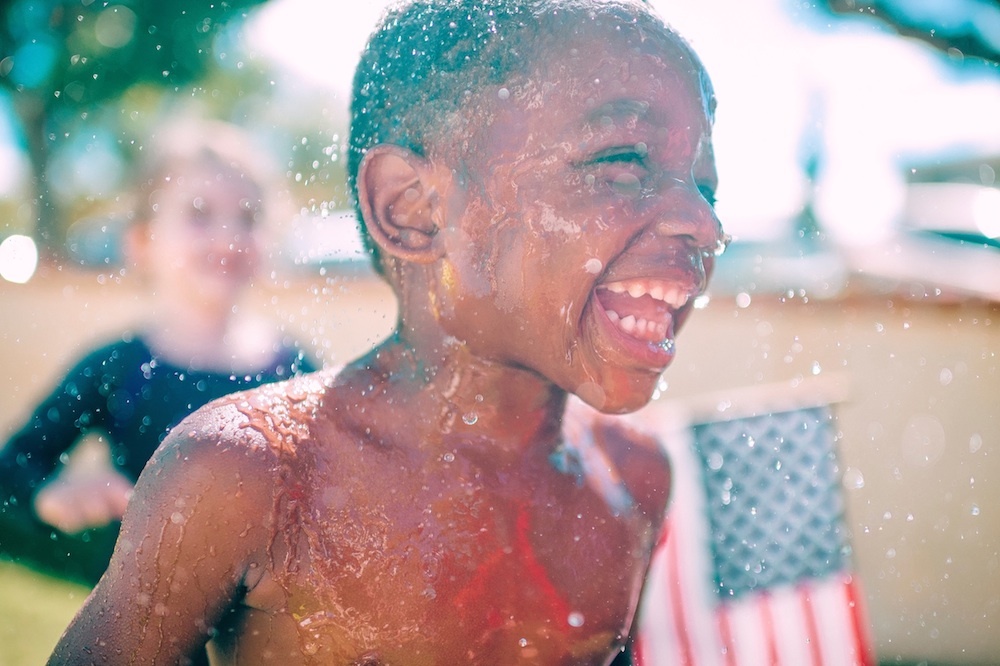
#5for5 campaign: how to help your child learn through play
Childcare, Early childhood development
Theirworld's #5for5 campaign is about standing up for the under-fives - here are 20 fun things you can do to help your young child develop.
Playing with your baby or toddler isn’t just fun – it’s laying down the foundations for the rest of their life.
Learning through play helps a child’s brain to develop in the vital first few years. It teaches them communications skills, how to solve problems and helps them to explore concepts like counting and shapes.
Play is one of the five areas of nurturing care that children need from birth to the age of five. The others are health, nutrition, learning and protection.
Theirworld’s #5for5 campaign is all about taking small actions that can have a big impact. We’re standing up for children who haven’t quite mastered standing yet.
We asked celebrities, parents and supporters to share pictures and videos of them high-fiving a child under five last week.
It’s one way of spreading the message that early childhood development is key and that leaders should be investing to establish quality programmes for the under-fives. You can see some of the best shares here.
But there are many things you can do to help your young child’s development through play. Here’s a fun guide to some activities you can do with young children – and they’re all free.
10 things children can play for free
10 things you can do with your child for free
- Read a book. Sit down and read to your children in an animated way – and see the smiles.
- Sing. We all remember the songs we were to sung to as a child. It will invoke memories of being comforted and close to you for the rest of their lives.
- Plant a garden, window box or flower tub. This can be a fun and therapeutic exercise. As well as getting enjoyment out of planting you can enjoy watching whatever you have planted grow.
- Have a water fight. If you’re lucky enough to live in a country where water is plentiful, be frivolous and show your fun side – preferably on a dry, sunny day.
- Look for wildlife. Whether you are in a park or a forest or just your own garden, make a list of the different things you can spot together.
- Puppet show. Use your children’s toys or anything available. Let them give you a show and see the personalities of the toys – and children – come to life.
- Draw a family picture. Encourage them to draw the people who are close to them.
- Rub their back. Or give them a massage. Touch is very powerful and a gentle show of affection. And let your child scratch your back in return.
- Invent a quiz or counting game. This can be educational. One game is have everyone sitting round the table and then start counting. When someone reaches a multiple of 10 they stand up. The one left sitting has won the game.
- Dance with them. Show them how to dance and how you like to dance.. Enjoy music together and feel any stress of the day melt away.

10 facts about the importance of play
- Play lays the foundation for literacy. Through play children learn to make and practise new sounds. They try out new vocabulary, on their own or with friends, and exercise their imagination through storytelling.
- Play is learning. Play nurtures development and fulfils a baby’s inborn need to learn. Play takes many forms, from shaking a rattle to peek-a-boo to hide-and-seek. Play can be done by a child alone, with another child, in a group or with an adult.
- Play encourages adults to communicate with the children. Adults support play by giving children the opportunity to engage in play, by knowing when not to intervene, and by knowing when to intervene.
- Play gives children the chance to be spontaneous. You may think your child should be rolling the truck on the ground but that doesn’t mean that truck is not equally useful as a stacking toy.
- Play gives children choice. Having enough toys or activities to choose from will allow children to express themselves.
- Play gives children space. To practise physical movement, balance and to test their own limits.
- Play gives adults the chance to learn how to play again. One of the most challenging parts of play is incorporating yourself in it.
- Play allows adults to learn their child’s body language. Knowing when you should incorporate yourself in your child’s play is key.
- Play teaches adults patience and understanding. If you do choose to join in your child’s play make sure that you do not try to take it over and force incorporation of your ultimate learning objectives into their play. Structured adult-led activities have their time and place but remember to allow for time for children to control and decide their own play.
- Play is fun. Learning to play well, both by themselves and with others, sets children up to be contented and sociable.
Source: National Literacy Trust
More news

